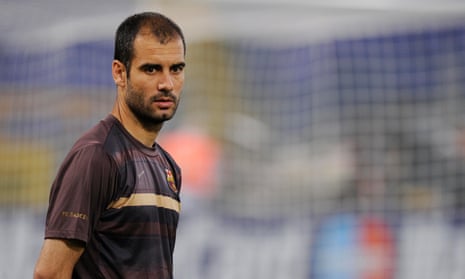Pep Guardiola regularly suggests that English football should copy the B-team system he enjoyed in Spain, where the biggest clubs enter their reserve sides into the lower leagues, some rising as high as the second tier. The Manchester City manager thinks adopting the Spanish model would help young players gain more experience of senior football and toughen them up.
“They would compete every weekend with real games, fighting to survive – then the managers in the Premier League will have more courage to pick them,” says Guardiola. “The second teams in Spain, at Barcelona or Real Madrid, play in front of 40,000 people and every weekend in the second league. In Italy or Germany, they are so tough, so demanding, they are playing with guys who are 28, 29 or 30 and that is the best way to improve, not training with the first team sometimes.”
The idea that Football League clubs should be cast aside to make way for reserve teams feels wrong and should be opposed vehemently. But, beyond the fact that Guardiola’s plan would tear apart more than a century of history, it also doesn’t hold up to much scrutiny. There are no reserve teams in Spain’s Segunda División this season and his claims about crowd sizes in the second tier are exaggerated to say the least. The justification for putting Premier League reserve teams into the EFL is usually “it’s what they do in Europe”. Well, not in France they don’t. And reserve teams did not even exist in Italy until this season when, in a controversial move, the newly created Juventus Under-23 side were placed in Serie C.
Yes, Germany has a B-team system, but most reserve teams get no higher than the fourth tier. That’s where the B team of Bundesliga leaders Borussia Dortmund play – and just 1,292 fans turned up to watch their Regionalliga West match last weekend. Four B teams play in Holland’s second division but Utrecht and AZ Alkmaar are facing relegation. Jong PSV and Jong Ajax (who lie fourth but cannot go up) play in 2,500-capacity arenas at their training grounds. Crowds are as tiny and intense as at Premier League 2 games.
It is a similar scenario in Spain and Portugal. Reserve teams can give young managers experience – Guardiola and Luis Enrique both managed Barcelona B on their way to the top job, while Zinedine Zidane and Santiago Solari both served their time for Real Madrid Castilla before stepping up to the first team – but at what level are these reserve teams really playing?
After just one season in the Segunda División, Barcelona B and Sevilla’s reserves were relegated last summer to join a dozen other reserve teams in Spain’s regionalised, 80-club third tier. Neither side is doing particularly well; in fact Sevilla Atlético are even in danger of a second successive relegation. Attendances figures bely Guardiola’s claims. Barça B are averaging 1,394 this season, Real Madrid Castilla a mere 1,066. The stage for these games is little different to Premier League 2, which Guardiola considers an inadequate test for City’s youngsters.
Apply the Spanish model to England and the top clubs would have their Under-23 teams dotted around League Two and the Conference. Would that weekly physical examination really produce more elite players? And would they even cope with it?
Second-tier football is too tough for teams of youngsters, however talented. There were five reserve teams in Portugal’s second tier last season: four finished in the bottom half of the table and one, Sporting B, were relegated to the regionalised, 80-team third tier. They look like being joined by Braga and Vitoria’s B team next season. And yet Porto B have dominated the Premier League International Cup over its five-year life, losing to Manchester City U-21s in the inaugural final, then winning it in 2017 at Sunderland u-23s and retaining the title against Arsenal at the Emirates last May.
B teams from Spain and Portugal have struggled in the PLIC this season, winning just two of their eight meetings with Premier League 2 opponents. Villarreal B did, however, inflict an astonishing and surely historic 7-0 home defeat on Liverpool Under-23s. Maybe playing men’s football every week is doing the Spanish some good after all.
This week in … 1982
In the Guardian, David Lacey reported on the Football League chairmen’s proposals to switch reserve team football from Saturdays to midweek, which “would enable clubs to exist on smaller playing staffs”. That Saturday, while the First Division’s extraordinarily unpredictable top five of Southampton, Manchester United, Swansea, Arsenal and Ipswich were wondering which one of them was going to lift Liverpool’s crown (answer: none), there were a full set of Central League and Football Combination fixtures. With youth games being played in the morning, most clubs had three games – something rarely seen nowadays.
Remember me?

Matty James has been unable to fulfil his potential at Leicester City. Signed in 2012, injuries and the better form of other midfielders have restricted the former Manchester United youngster to just 100 league appearances in seven seasons. He missed the title-winning season completely and a reoccurring Achilles injury means he is yet to appear in the Premier League this season. Now 27, James was in back in Premier League 2 action for the Foxes’ reserves earlier this month but is unlikely to treasure the memory. Playing in front of just 226 at the Lancashire FA ground in Leyland, Leicester had Calvin Ughelumba sent off when trailing Blackburn 1-0 before half-time, then crashed to a 7-1 defeat, six different Rovers players getting on the scoresheet.
Next man up

In December, I speculated that Rabbi Matondo, then of Manchester City, was the fastest footballer in England. Last week the 18-year-old Welshman was on bench against City in the Champions League, having moved to Schalke in January for around £10m. His incredible speed and potential were not enough to earn a debut under Pep Guardioloa, but he made his first appearance for Schalke earlier this month in the Bundesliga.
Fantasy football
A Conference South club knocking a Premier League club out of the cup would usually gather serious media frenzy. But earlier this month, Watford tumbled out of the Herts Senior Cup to St Albans City and no one batted an eyelid. It was hardly a high-profile meeting. Watford, the home side, opted to switch the game to St Albans’ Clarence Park home, and only 302 turned up. Hornets fans struggled to recognise any of the names on their team sheet, let alone the faces. Ryan Cassidy equalised for Watford but they could not see off their older non-league opponents in a feisty extra-time, and Cassidy was among the first three Watford penalty-takers to miss.
Follow Gavin Willacy and Playing in the Shadows on Twitter

Comments (…)
Sign in or create your Guardian account to join the discussion